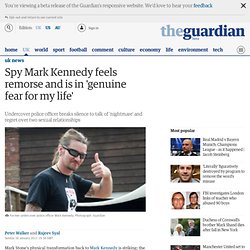

Spy Mark Kennedy feels remorse and is in 'genuine fear for my life' Mark Stone's physical transformation back to Mark Kennedy is striking: the sunglasses, earrings and scruffy beard are gone and the ponytail has been shorn into a neat parting; long sleeves on a sensible jumper cover densely-inked forearm tattoos.

But three months after the 41-year-old admitted tearfully to fellow green activists that they had spent seven years living and protesting with an undercover police officer, it is clear from his interview with the Mail on Sunday that the psychological reversal will take considerably longer. After a week of front-page stories and increasingly troubling revelations about his time under cover, Kennedy, 41, finally broke his silence today for the first time since going into hiding to detail what he calls his "living nightmare" in which he stands accused of betrayal by both his former employers and the activists he duped for so long.
He added: "I went to see a psychiatrist recently and told her I was having thoughts of suicide. Mark Kennedy: secret policeman's sideline as corporate spy. The undercover police officer whose unmasking led to the collapse of a trial of six environmental protesters on Monday apparently also worked as a corporate spy, according to documents seen by the Guardian.

Details of how Mark Kennedy went from police officer to businessman reveal the extent to which shadowy corporate firms appear to have developed links with the police. It also reveals something about Kennedy himself: with an apparent view to making money out of his access, the undercover officer used cryptic names derived from a science fiction television series, Stargate.
From 2003 until around March last year, Kennedy lived in the midst of the protest movement with the fake identity Mark Stone. Remarkably, he appears to have used that same undercover identity – which according to him cost the taxpayer £1.75m – to venture into private practice. It is not known why Mark John Kennedy – born in Camberwell, south London on 7 July 1969 – quit his police job. Families of dead children whose identities were used by undercover police have not been informed - Crime - UK. Derbyshire Chief Constable Mick Creedon, who is leading a probe into the activities of undercover police, said that the relatives deserve an apology but revealing the names used "would and could put undercover officers at risk".

So far 40 officers have been interviewed as part of Mr Creedon's investigation, called Operation Herne The identities were of children born between 1940 and 1975, and officers used the names of children aged between four and eight. Mr Creedon's report on the use of deceased children's names, published on Tuesday, also revealed that the practice could have been used outside of Scotland Yard's Special Demonstration Squad (SDS) and the National Public Order Intelligence Unit (NPOIU), by police officers and possibly the security services.
"It would be a mistake to assume that the identities of dead children were used solely by the SDS and the NPOIU and the possibility is that the tactic was more widely used. " Police spies stole identities of dead children. John Dines, an undercover police sergeant, as he appeared in the early 1990s when he posed as John Barker, a protester against capitalism Britain's largest police force stole the identities of an estimated 80 dead children and issued fake passports in their names for use by undercover police officers.

The Metropolitan police secretly authorised the practice for covert officers infiltrating protest groups without consulting or informing the children's parents. The details are revealed in an investigation by the Guardian, which has established how over three decades generations of police officers trawled through national birth and death records in search of suitable matches. Undercover officers created aliases based on the details of the dead children and were issued with accompanying identity records such as driving licences and national insurance numbers. Some of the police officers spent up to 10 years pretending to be people who had died. Ces apprentis James Bond qui espionnent la gauche et les écologistes. Leurs défenseurs les comparent à des sortes de James Bond, qui fréquenteraient squats et lieux autogérés plutôt que des casinos huppés, qui participeraient à des « camps climat » ou à des actions de résistances passives plutôt qu’à de spectaculaires courses-poursuites.

Ces espions au service de sa majesté, ce sont les policiers infiltrés au sein des mouvements écologistes ou anticapitalistes. Ces méthodes d’infiltration font l’objet de virulentes critiques au Royaume-Uni, depuis qu’elles ont été révélées par l’affaire Mark Kennedy. Ce policier s’est infiltré entre 2003 et 2010 au sein de groupes de la gauche radicale européenne, dont le collectif militant de Tarnac, avant d’être démasqué. Les informations transmises par Kennedy ont notamment été utilisées par la DCRI (Direction centrale du renseignement intérieur) pour monter son dossier contre « les neuf de Tarnac ».